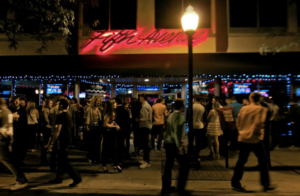
Today I will continue my series on relevant legal topics by discussing the common charge of Disorderly Conduct in the 44th District Court (Royal Oak).
Royal Oak is one of the most popular nightlife spots in the Metropolitan Detroit area. It attracts many college students and young adults every week for dinner, drinks, and entertainment. However, this results in high number of Disorderly Conduct charges due to people being intoxicated in the streets and engaging in drunken behavior. The Royal Oak Police will cite anyone that engages in this type of behavior with a ticket for disorderly conduct.
An important thing to remember is that this charge is in fact a misdemeanor and NOT a civil infraction. You could actually go to jail for simply not responding to an officer’s command as you leave one of the bars or for mere horseplay or roughhousing among friends as you spill out into the street after an enjoyable night out.
The City of Royal Oak defines Disorderly Conduct as:
A person commits the offense of disorderly conduct if he or she:
- Engages in fighting or in violent, tumultuous or threatening behavior;
- Makes unreasonable noise which tends to cause a public danger, alarm, disorder or nuisance;
- Uses threatening, abusive or obscene language or makes an obscene gesture, which by their very use inflict injury or tend to incite a breach of the peace;
- Without lawful authority, disturbs any lawful assembly or meeting of persons;
- Obstructs vehicular or pedestrian traffic;
- Possesses or consumes alcoholic liquor in any public park, public place of amusement, or area under the jurisdiction of the City of Royal Oak that is owned and/or administered by the City of Royal Oak;
- Urinates in a public place, except at public toilets.
- Engages in an illegal occupation or business;
- Loiters in a house of ill fame or prostitution or place where prostitution or lewdness is practiced, encouraged, or allowed;
- Knowingly loiters in or about a place where an illegal occupation or business is being conducted;
- Is found jostling or roughly crowding people unnecessarily in a public place;
- Commits the offense of failure as a disorderly person to disperse if he or she participates with two more other persons in a course of disorderly conduct likely to cause substantial harm or serious inconvenience, annoyance or alarm, and intentionally refuses or fails to disperse when ordered to do so by a peace officer or other public servant engaged in executing or enforcing the law;
- Permits or suffers any place occupied or controlled by him or her to be a resort of noisy, boisterous, or disorderly persons.
- A person commits the offense of public intoxication if he or she appears in a public place under the influence of alcohol, a controlled substance, other drugs or combination thereof and he or she is either endangering directly the safety of another person or of property, or is acting in a manner that causes a public disturbance.
- Commits the offense of window peeping.
Essentially, this law covers a wide range of conduct and acts as a “Catchall” charge for conduct that people may fail to realize is actually criminal activity. As I mentioned earlier; disregarding an Officer’s command or jostling with a few friends are common fact patterns. Being extremely loud, harassing others, failing to disperse from an area, or tampering with public property can also result in a Disorderly charge. Please remember to be kind and cordial with the Police and do not attempt to get away or lash out at them in any way. This will only complicate the case when it does get to court.
In my experience, both Judge Meinecke and Judge Wittenberg are fair and understanding men that will listen to well-reasoned arguments. They understand that most people who get this type of charge are young adults who can be severely harmed by having a misdemeanor conviction on their criminal record. Oftentimes, these cases can be resolved by advocating on a client’s behalf and showing that this is in fact an isolated incident. If the Judge is convinced of this I can generally get my client placed on a probationary period that will result in the case getting dismissed at the end of the term. This is imperative to keep his/her record clean and avoid any future complications.
Please remember to contact my office with any legal questions or concerns.